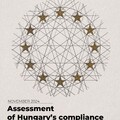Hungary’s current whistleblower act came into force on 1 January, 2014. The present article intends to give a brief overview on how the reshaped regulation was implemented and used in public interest disclosures during the past five years. The rarity of cases in which the new legislation has been applied seems to confirm the perception that authorities are unfamiliar with this legal institution and therefore are unwilling to implement it in their jurisprudence.
Hungary’s whistleblower act replaced the Act on the Protection of Fair Procedures from 2010 that consisted of a wider range of protective measures than the new law (Act CLV. of 2013), however it was not effective as the institution in charge for the protection of whistleblowers was never established (the President of Hungary refused to sign the accompanying law that would have established the institutional framework of whistleblower protection). The reasoning behind the new law was to replace a regulation that existed only on paper, but never achieved its aim by implementing effective legal tools and institutional background to enhance public interest disclosures and the protection of whistleblowers.
The current law (Act CLV. of 2013) aims to provide a comprehensive legal framework to protect citizens reporting malpractices with the aim to serve the public interest. The law empowered the Office of the Ombudsman to serve as a main contact for whistleblowers and ensure the secure transmission of disclosures to the institutions in charge of investigating the content. The disclosure has to be investigated within 30 days, the whistleblower has to receive feedback on the results and consequences. Moreover the Office of the Ombudsman can control whether investigations were fair and lawful. The Ombudsman however does not have the power to check whether investigations were substantive, profound or accurate. Whistleblowers can also directly turn to the body they consider to be entitled to take action. This can be the organization that is the subject to the report or its supervisory authority. It is not specified whose responsibility it is to investigate whistleblower reports within a certain organization, neither exists any soft-law guidance on who to turn to, besides the reference in the law naming the “body entitled to proceed”. According to the Hungarian Ministry of Justice (hereinafter: MoJ) the person in charge for public interest disclosures shall be the head of the organization. In practice this means that there are no rules in place that would ensure that reports don’t fall into wrong hands, which is another major shortcoming of the law.
The law does not explicitly absolves whistleblowers from their obligation of keeping internal information or business secrets. Hence legal practice is of utmost importance, as protection will depend on the details of the individual cases. According to the MoJ the only secure way of reporting in this regard is using the electronic system by the Ombudsman, as it has authorization to process confidential data. The MoJ also stated in their interpretation of the law, that whistleblowers become protected in the moment of filing their report. However, in case of suspicion of wrongdoing by a whistleblower, proceedings aiming to reveal a possible crime are not considered detrimental measures. This means that the protection guaranteed by the wording of the law does not prevail in practice.
Looking at other important elements of the legal protection of whistleblowers, the Hungarian framework is also lacking clear provisions on providing legal aid, financial support or protection to the relatives of whistleblowers. According to the new criminal code adopted in 2012 the persecution of whistleblowers is not a felony anymore but regarded as a misdemeanor. Moreover the practical conditions of real protection are also lacking, since the government decree that should have regulated the details of protection has not been adopted since 2014. The Ombudsman’s Office has very limited powers to assist whistleblowers as it cannot coerce the execution of its recommendations, it also has very little financial and personal capacities. Hence it is in itself a remarkable achievement that it can follow and examine the few hundred cases filed in the last years. A great share of these are rather complaints then hard core whistleblower reports. One report on a specific case published on the Ombudsman’s website gives valuable insight into the status of the Ombudsman's Office in Hungary’s public administration, the MoJ did not even answer its questions for more than a year. Still a more proactive role of the Ombudsman’s Office would be appreciated as it has the right to formulate recommendations and could show leadership in improving the current legislation by trying to push the Government to act. Polls also show that the society’s readiness to blow the whistle has not increased as a result of the law. The overall assessment of Hungarian NGOs K-Monitor and HCLU is that the law rather serves as a formal treatment than a real solution to a fundamental shortcoming of the country’s anti-corruption framework.
The core question of every legislation is whether it is capable to protect whistleblowers against unlawful maltreatment. Under the Hungarian law, every detrimental measure taken or initiated against the whistleblower as a consequence of the disclosure is unlawful even if it was legitimate otherwise. The Act stipulates the exceptions when legal action can be initiated against a whistleblower acting mala fide: in case suspicion of criminal behaviour, the personal data on the whistleblower can be transferred to the investigative authorities; well-founded circumstances showing the liability of the whistleblower, personal information can be forwarded to the competent authority. The main question is, what level of suspicion of unlawfulness on behalf of the whistleblower constitutes a solid legal basis to override the presumption of her right to be protected. Being reported to the police as a potential perpetrator of a crime or subjected in disciplinary procedures are clearly detrimental actions one has to face without any competent authority evaluating the wrongfulness of the disclosure. As a result of the complexity of legal issues raised by a public interest disclosure, it is not possible to give a general answer. One has to rely on the internal logic of each legal field where the potential detrimental action is initiated against the whistleblower. This means that the general protection and its exemptions have to be interpreted in the context of the specific procedure, and it is the task of the competent authority to evaluate and apply the provisions of the Whistleblower Act. Three recent whistleblower cases, all handled by the legal aid service of the Hungarian Civil Liberties Union, may demonstrate possible responses to such dilemmas..
In November of 2013, András Horváth, a former tax inspector, disclosed systematic VAT evasion practices in trade of cereals and cooking oil. Mr. Horváth claimed that the inquiry he was assigned on had been aborted by his superiors without reasonable explanation. He exposed the evasion system to the government and to the competent committee of the Parliament. Having not succeeded in addressing the relevant authorities Mr. Horváth turned to the media. His statements, according to which high level officials at the tax authority are involved in the corruption, were widely publicized. Within days of the public disclosure, the tax authority conducted an internal enquiry, which found violation of the internal disciplinary code on behalf of Mr. Horváth and reported the case to the investigative authorities claiming that Mr. Horváth committed crimes by misusing his access to the tax databases. Ironically, the special department responsible for corruption related crimes launched a criminal procedure based on the submissions by the tax authority. In early December 2013, a home search took place at Mr. Horváth’s apartment and in his car. The investigators seized his computer, personal notes and list of contacts with NGOs and journalists. He was not formally charged until January 2017. The Public Prosecutor’s Office (hereinafter: PO) dismissed the case in April 2017 by accepting the proposition of Mr. Horváth’s defense, and declared that accessing databases and usging data to report corruption as an employee of the tax authority do not constitute crimes. The decision was based on substantive criminal law, nevertheless, the order contains an argument on the role of public interest disclosures in the frame of criminal proceedings. The PO emphasized that Mr. Horváth’s actions did constitute public interest disclosure which could lead to the dismissal of the procedure due to the special protection of whistleblowers acting in good faith as a ground of partial or total exemption from criminal responsibility. Nevertheless, the PO did not find it necessary to examine whether Mr. Horváth actions were conducted in good faith since other preliminary substantive questions of criminal law already resulted in the dismissal. The PO’s decision might prove useful in the future, as it defines the role of good faith public interest disclosure within the frame of criminal law and recognizes whistleblowing protection as a special ground of exemption from responsibility even if the facts and deeds might amount to criminal activity.
In another case the investigative authorities similarly by-passed the detailed evaluation of the public interest disclosure. A high school student hacked the freshly introduced online purchase system of the public transport company of Budapest by using his own name and immediately reported the incident to the company. The police searched his home for evidence and he was formally suspected with breach of information system of public utility after the company reported his action. The order of dismissal pointed out that the defendant’s action was not harmful to the society, which is an element of crime. The order claimed that the defendant's action might constitute a public interest disclosure, however, it is not necessary to examine this since the case was being dismissed, hence there is no harmful consequence for the whistleblower. The lack of societal harm (or material illegality) gives the authorities a certain level of discretionary power when the formal application of the criminal code would have unjust consequences - as in a case of ethical hacking. Here the mere fact of the public interest disclosure would justify the lack of harmful societal effects, therefore the disclosure should have been evaluated.
Defining interaction between individual legal responsibility and whistleblower protection proved to be more unclear within the framework of the Code of Ethics (CE) of Patent Agents. György Pintz found out that the online registration platform operated by the Hungarian Intellectual Property Office (HIPO) suffered from major IT vulnerability as a result of which anyone with basic IT skills had the chance to access patent applications. In order to demonstrate the flaws of the software, he downloaded three applications in the presence of a public notary. He also received a CD containing dozens of applications from an unknown source. Mr. Pintz disclosed the thwarting to the MoJ which oversaw the operation of the HIPO at the time of disclosure. The software error was fixed within a week. Surprisingly, the Chamber of Patent Agents launched a disciplinary procedure against Mr. Pintz, because in their opinion, the possession of the patent applications (which were obviously not his own applications) and the fact that he did not inform immediately the HIPO constituted a breach of the CE as his actions undermined the dignity of the profession. The Disciplinary Panel barred Mr. Pintz from the exercise of his profession for 5 years, but the judicial review procedure resulted in an order to retrial of the case by the Panel. The defense of Mr. Pintz argued with the courts that some form of possession to the otherwise confidential data was the necessary to support his claim, and there had been no evidence showing that Mr. Pintz misused the applications. Furthermore, the MoJ was the competent authority to act upon the disclosure, therefore abstaining from reporting the IT error to the HIPO did not constitute malfeasant omission. Unfortunately, the Supreme Court in its verdict did not answer the first objection. It nevertheless stated that a public interest disclosure can be considered as belated and that could constitute disciplinary responsibility. Consequently - argued the Court - the Disciplinary Panel did not breach the laws on whistleblower protection by refusing to consider Mr. Pintz as a whistleblower acting in good faith, because the omission to report to the HIPO (besides the MoJ) is not to be seen as part of the disclosure. This line of argument misses the point: picking the addressee of the disclosure is also an important part of the disclosure, and if it is not unreasonable and the whistleblower acted in good faith, it merits the same level of protection. The Court undermines the protection of whistleblowers by the narrow interpretation of what constitutes a “disclosure”. One of the core questions of the retrial is that under what circumstances a disclosure can be considered as belated.
In the context of the criminal law, one can effectively argue that the internal logic of the criminal law gives multiple line of argument enhancing the protection of whistleblowers either as a factor to justify the lack of an element of crime (societal harm) or as an exemption from criminal responsibility. Either way, it does not address the harm suffered by the whistleblowers such as the search of the home, seizures, being placed under investigation. Obviously, the most important for the whistleblowers is to avoid the potential criminal sanctions, however it would be fortunate to grant them - at least moral - compensation for the drawbacks.
Beyond the criminal context, the protection of whistleblowers is rather delicate as a consequence of the lack of symbolic and strong cases. Looking at the known court cases involving whistleblowers and analysing the reports of the ombudsman’s office it can be clearly seen that there is great caution when it would come to set precedential cases or address the lawmaker to change the legal framework. More proactive interpretation of the law and the ambition to guide further legal practice could be an important boost for the protection of whistleblowers, especially now, when it is obvious that there is no political commitment to provide sufficient protection and support to whistleblowers in Hungary.
This article was co-authored by Tivadar Huttl, lawyer at HCLU and partner at HMP Legal and Sandor Lederer, director of K-Monitor in february 2019. The article was supported by the Southeast Europe Coalition on Whistleblower Protection.
Címkék: english whistleblowing
Szólj hozzá!
A bejegyzés trackback címe:
Kommentek:
A hozzászólások a vonatkozó jogszabályok értelmében felhasználói tartalomnak minősülnek, értük a szolgáltatás technikai üzemeltetője semmilyen felelősséget nem vállal, azokat nem ellenőrzi. Kifogás esetén forduljon a blog szerkesztőjéhez. Részletek a Felhasználási feltételekben és az adatvédelmi tájékoztatóban.





